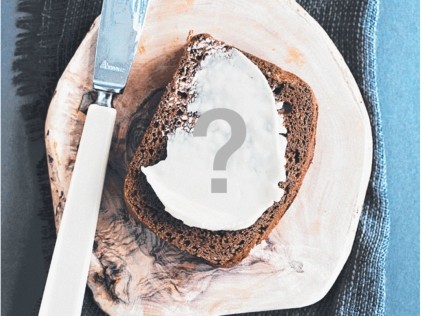
Find out which choice is best:
1. Margarine or butter?
Verdict: Margarine
While we don’t need spreads on our breads, margarine is the healthiest option as it is a blend of sunflower, canola and olive oils. If you must use a spread, choose a low-fat, low-salt margarine,” says dietitian Milena Katz.
“Unlike in the UK and the US, our margarine is actually quite good, as it is low in trans fats and salt, so it doesn’t have too many negative effects on our health.” Saturated fats are bad for the heart, so buy a premium margarine as the cheap options have more trans fats. “More expensive margarine has added plant sterols which help to lower cholesterol levels,” Katz says.
For those who use butter because they think it’s natural, it’s time to re-evaluate the sandwich strategy. “Butter is still processed,” Katz says. “There are no extra nutrients in butter, either, compared to margarine. In fact, margarine has added vitamin D, which, as a nation, we’re deficient in.” Low levels of vitamin D have been linked to cancers, brittle bone diseases and general ill health.
2. Tap water or vitamin water?
Verdict: Tap water
Don’t waste your money on vitamin water,” Katz says. “It’s full of sugar – around seven teaspoons per bottle – and the amount of vitamins in them are so low it won’t have any impact. It’s really no different to drinking cola.”
So, stick to your tap water for free nutritional benefits. “Ideally, use a filter, although it’s not strictly necessary,” Katz says.
3. Supplements or fresh fruit & veg?
Verdict: Five veg a day
Dietitian Tara Diversi, author of The Good Enough Diet (Wiley) says: “Vitamins will never replace the nutritional benefits you receive from fresh fruit and vegetables. They contain dietary fibre, which is rich in probiotics. This improves your gut bacteria, so you will better absorb the minerals in the food.” Diversi says that while vitamins and supplementshave their place, it is important not to “use them as a replacement or as an insurance against ill health”.
Be aware that a healthy lifestyle and waistline is not just about following the five-a-day rule. “Having at least five servings of fruit and vegetables is great, but you should focus on eating as many vegetables as you can before going onto your fruit portions,” Diversi says.
“It’s also a good idea to avoid starchy vegetables, such as potatoes, sweet potatoes or pumpkin if you’re watching your weight.” Finally, are frozen vegetables an acceptable option or should you always opt for fresh? “Frozen produce is just as good as fresh – the important thing is that you’re consistently eating vegetables,” Diversi says.
4. Vegetarian or carnivore?
Verdict: A combination
“A balance between the two is ideal,” Diversi says. “If you eat too much meat there are a lot of consequences to your health. However, many vegetarians don’t eat a balanced diet, either – some opt for lollies and white rice for a quick energy hit.”
For an ideal eating plan, follow these simple rules: “Choose your lean meat, add a carbohydrate and choose some non-starchy vegetables,” Diversi says. “If you’re vegetarian then you simply must eat legumes and lentils, which are full of protein.” The fibre in lentils and legumes can make it difficult to absorb iron, so eat citrus fruits, add vinegary dressings to your salads and eat other acidic ingredients to help keep your energy levels up.
“If you’re planning on becoming a vegetarian, see a dietitian to ensure you’re doing it right and avoid risks of bowel cancer and digestion problems,” Diversi says.
5. Red wine or white wine?
Verdict: Red wine
A glass of cold white wine may hit the spot, but for health reasons you are better off uncorking a bottle of red. “Red wine contains resveratrol, which is found in the skin of the grapes. White wine doesn’t contain this,” Katz says.
“Resveratrol, along with antioxidants in red wine, are believed to help heart health.” Resveratrol has been linked to preventing diabetes, cancers, prostate disease and Alzheimer’s. To ensure you’re getting the benefits of the resveratrol, sip your wine slowly and remember that two glasses a day is more than plenty. “We should all have at least two alcohol-free days every week, too,” Katz says.
6. Steam or boil?
Verdict: Steam
Don’t overcook vegetables,” Diversi warns. “When steaming veg, keep them a little underdone so you retain most of the vitamins.” And if you are cooking your vegies in the microwave, Diversi says, “Use very little water, if any.
Then use whatever liquid has collected at the bottom of the bowl as a sauce to pour over your meal. That liquid contains all the nutrients.”
Source: bodyandSoul
 We are sharing information for knowledge. Presented by. SocialDiary.Net
We are sharing information for knowledge. Presented by. SocialDiary.Net



